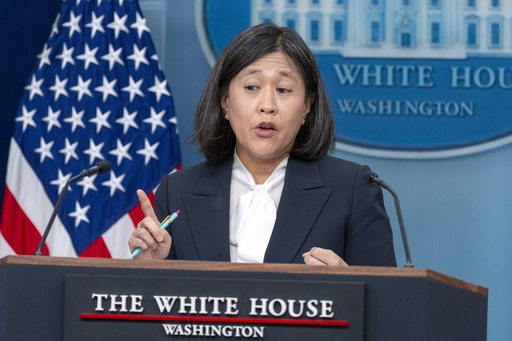In her role as the United States Trade Representative, Katherine Tai is forbidden by law from discussing the upcoming presidential election, but the future of fair trade is at stake in the November ballot. Voters are being asked to consider whether the U.S. should collaborate with other countries or take an antagonistic approach. The key question is whether they support advancing worker protections in trade negotiations, as Tai champions for the Biden-Harris administration, or increasing tariffs on nearly all imports as proposed by former President Donald Trump.
Tai believes that her efforts over her nearly four years in office have been successful in redirecting the focus of the U.S. and its trading partners towards workers’ rights. Past trade agreements have often prioritized cost-saving through the utilization of cheap labor, which in some cases led to worker exploitation. Critics, including business leaders, economists, and Republicans, argue that the U.S. has not made adequate progress in forming new trade partnerships and countering China’s growing influence.
While Trump advocates for broad tariffs on imports as a means to bring back American manufacturing jobs, most economists warn that such actions would harm economic growth and increase inflation. Tai, who holds degrees from Yale University and Harvard Law School, aims to bring a blue-collar perspective to trade negotiations. She has incorporated labor union voices into the trade process and seeks to protect emerging industries from unfair competition, such as implementing a 100% tariff on Chinese electric vehicles.
Some economists believe that the decline of domestic manufacturing jobs cannot solely be attributed to competition from China; rather, factors such as productivity gains and shifts towards the services sector have played a role. Despite criticism and unfinished work, Tai remains committed to innovative trade policies that prioritize workers’ rights and environmental protections.
Tai touts the success of the U.S.-Mexico-Canada Agreement, a revised North American trade deal signed during the Trump administration, as a model for her trade approach. The agreement includes mechanisms to penalize factories that violate workers’ rights, leading to tangible benefits for Mexican workers. Tai views this as a way to empower workers through trade and ensure that American workers are not forced to compete with exploited labor from neighboring countries.
As the 2020 election approaches, Tai’s cautious approach to discussing trade in the context of the presidential campaign underscores her commitment to advancing fair trade policies. She stresses the importance of translating trade agreements into action to benefit workers and uphold their rights, pointing to the need for tangible results beyond mere written promises.
